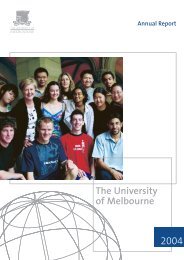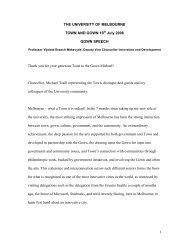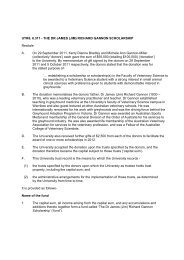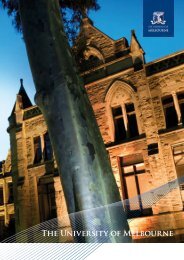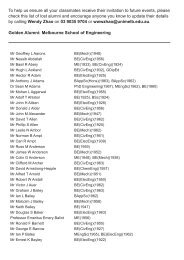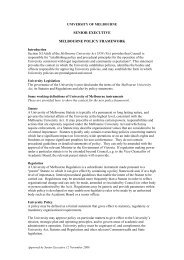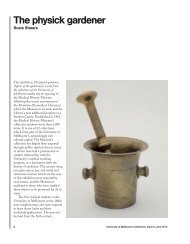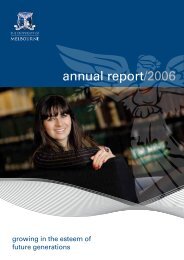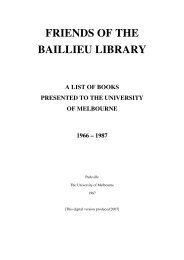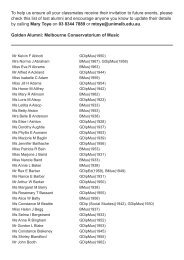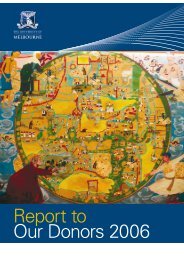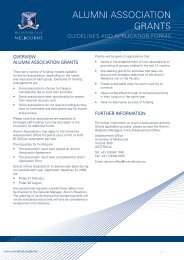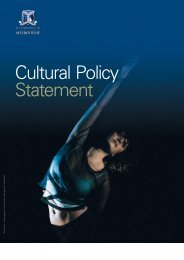2010 International Undergraduate Prospectus nts. u.au
2010 International Undergraduate Prospectus nts. u.au
2010 International Undergraduate Prospectus nts. u.au
Create successful ePaper yourself
Turn your PDF publications into a flip-book with our unique Google optimized e-Paper software.
Areas of specialisation are Clinical<br />
Psychology, Clinical Psychology<br />
(Child Specialisation) and Clinical<br />
Neuropsychology.<br />
The Master of Psychology program involves<br />
coursework, placement and a minor thesis<br />
(6,000 - 10,000 words). During the first<br />
year of the course, stude<strong>nts</strong> complete a<br />
number of subjects designed to provide<br />
an introduction to the relevant area and to<br />
train them in the basic professional skills in<br />
preparation for placeme<strong>nts</strong> appropriate to<br />
their particular specialisation. Stude<strong>nts</strong> also<br />
complete their first professional placement.<br />
In addition, stude<strong>nts</strong> commence work on<br />
an empirical thesis in the first year of study,<br />
which is submitted for examination in the<br />
final year of the course.<br />
During the second year of study, stude<strong>nts</strong><br />
complete a series of advanced subjects.<br />
In addition, stude<strong>nts</strong> participate in a series<br />
of practical training placeme<strong>nts</strong>, which<br />
provide exposure to a variety of models<br />
of professional practice, and practical<br />
involvement with clie<strong>nts</strong> in a wide variety<br />
of situations. Stude<strong>nts</strong> are expected to<br />
display an increased level of responsibility<br />
and competence as they proceed through<br />
the sequence of placeme<strong>nts</strong>. Stude<strong>nts</strong> are<br />
also expected to maintain high standards<br />
throughout the course.<br />
More information: www.psych.unimelb.edu.<br />
<strong>au</strong>/courses/postgraduate/pt.html<br />
Creating a world of career<br />
opportunities with the Master of<br />
Psychology<br />
Graduates from the Master of Psychology<br />
continue to be in high demand. The<br />
rigourous training provided by the University<br />
means our graduates are well-regarded<br />
within the profession. Many have found<br />
employment opportunities overseas.<br />
More information: www.psych.unimelb.edu.<br />
<strong>au</strong>/courses/postgraduate/pt.html<br />
Professional and international<br />
degree recognition<br />
The Master of Psychology is accredited by<br />
the Australian Psychology Accreditation<br />
Council (APAC), the accrediting <strong>au</strong>thority<br />
for psychology courses t<strong>au</strong>ght in Australia.<br />
These qualifications are well-regarded<br />
overseas. All Masters programs serve<br />
as approved fifth and sixth year for<br />
membership of the relevant college of the<br />
Australian Psychological Society.<br />
Master of Public Health<br />
Duration and campus<br />
1.5 - 2 years full-time<br />
Parkville - some electives may be offered<br />
in distance or block mode<br />
Entry requireme<strong>nts</strong><br />
A non-health related degree (or<br />
equivalent) and a minimum of two years<br />
relevant work experience; or a healthrelated<br />
degree with no health-related<br />
experience.<br />
Extra requireme<strong>nts</strong><br />
No.<br />
More information<br />
Melbourne School of Population<br />
Health<br />
t +61 3 8344 9339 or +61 3 8344 9338<br />
f +61 3 8344 0824<br />
e sph-gradinfo@unimelb.edu.<strong>au</strong><br />
w www.sph.unimelb.edu.<strong>au</strong><br />
Course description<br />
The Master of Public Health course is<br />
designed to build sound skills and expertise<br />
in Australian and international public health.<br />
It aims to provide graduates with the<br />
knowledge and skills necessary to develop,<br />
analyse and implement policy; to plan and<br />
evaluate health services and programs;<br />
and understand how research and project<br />
work are conducted, all within the public<br />
health context. The Master of Public Health<br />
also provides the practical skills needed<br />
to design, conduct, analyse and report on<br />
research.<br />
The Master of Public Health is flexible by<br />
design and allows stude<strong>nts</strong> to modify<br />
their specialisation during their course<br />
as they progressively learn more about<br />
public health research and practice. This<br />
ability to self-tailor also permits stude<strong>nts</strong><br />
to create a highly specialised program<br />
providing focused training in specific health<br />
disciplines and research methods.<br />
Specialisations are available in<br />
Epidemiology and Biostatistics, Health<br />
Economics, Economic Evaluation, Health<br />
Program Evaluation, <strong>International</strong> Health,<br />
Primary Care, Sexual Health, Social Health,<br />
and Womens’ Health.<br />
Creating a world of career<br />
opportunities<br />
The Master of Public Health is a core<br />
requirement for public health professional<br />
work in many areas of government and<br />
within public health systems. The Master<br />
of Public Health is the preferred pathway<br />
into a suite of professional roles with the<br />
public health profession including health<br />
protection and health promotion.<br />
Professional and international<br />
degree recognition<br />
The Master of Public Health is recognised<br />
nationally and globally as the entry degree<br />
for public health professional practice.<br />
Master of Science<br />
Duration and campus<br />
2 years full-time<br />
Parkville<br />
More information<br />
Melbourne Graduate School of Science<br />
t +61 3 8344 6404<br />
f +61 3 8344 5803<br />
e www.science.unimelb.edu.<strong>au</strong>/ask/<br />
w http://graduate.science.unimelb.edu.<strong>au</strong><br />
Entry requireme<strong>nts</strong><br />
Master of Science – An undergraduate<br />
degree in an appropriate discipline with at<br />
least a H3 (65%) in the major or equivalent.<br />
Entry is also subject to the availability<br />
of appropriate research topics and<br />
supervisors.<br />
Master of Science (Biotechnology) – A<br />
Bachelor degree with a major in a Life<br />
Science or Chemistry and at least a H3<br />
(65%) in the major, or equivalent.<br />
Master of Science (Environmental<br />
Science) – A Bachelor degree in an<br />
appropriate discipline with at least 65% in<br />
the major, or equivalent.<br />
Master of Science (Management<br />
Science) – A Bachelor degree in<br />
an appropriate discipline including<br />
mathematics, statistics and operations<br />
research, engineering, information<br />
technology, computing, commerce or<br />
business, with at least H3 (65%) in the major<br />
or equivalent.<br />
Master of Science (Nanotechnology) –<br />
Science entry: Bachelor degree with first<br />
year Mathematics and a major in Chemistry<br />
or Physics with a final score of at least 65%,<br />
or equivalent.<br />
Engineering entry: An appropriate four-year<br />
engineering degree with a final score of at<br />
least 65% or equivalent, or an appropriate<br />
93




